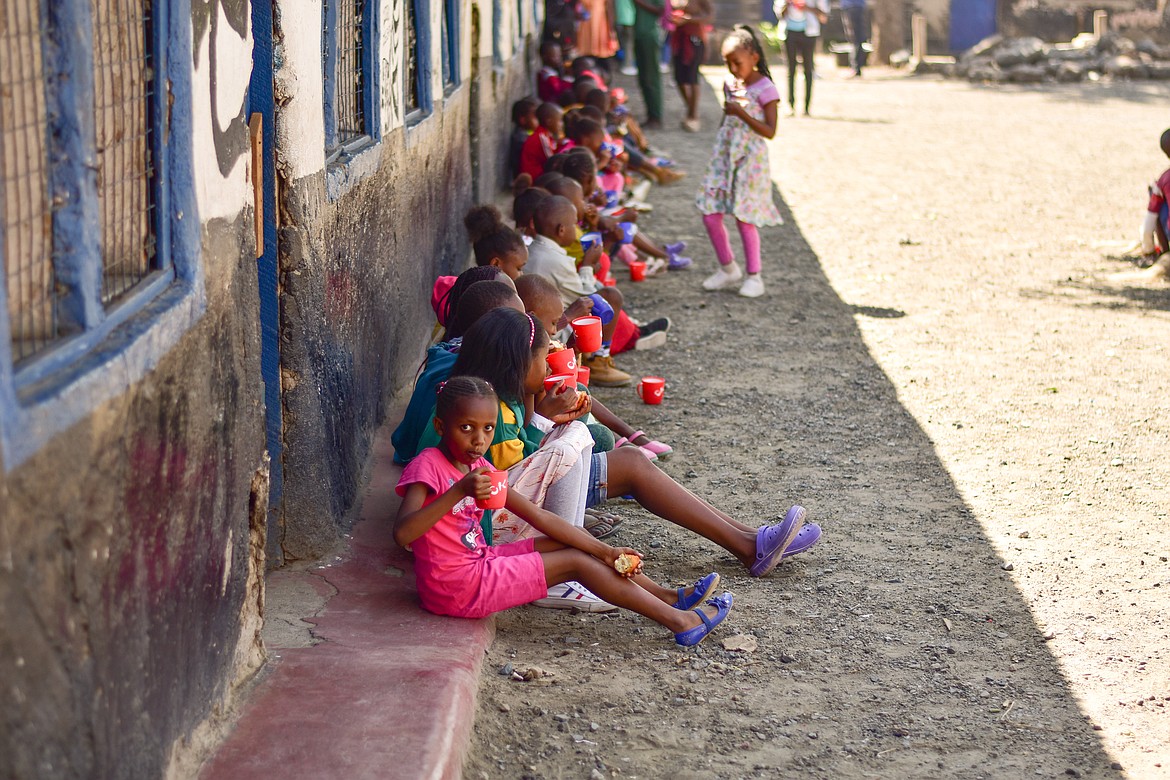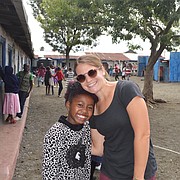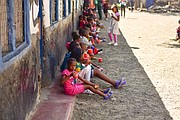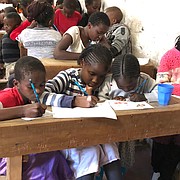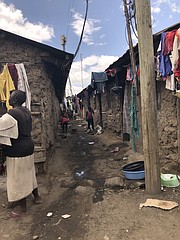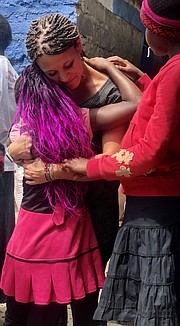Start Small, think big
By Jennifer Buley
Special to Coeur Voice
Born and raised in the small cities and towns of North Idaho, I found myself with a defiant attitude. I don’t really know why exactly, but it seemed in my nature to do the opposite of what people expected.
From a young age, I also had an infatuation with Africa, maybe because of my lack of knowledge for the continent. I often declared I would move there one day, though never having a plan, specific destination or any notion of what I would do there.
Upon graduating from Lake City High School in 2008, I proudly proclaimed I would never go to college. I quickly moved to the glorious chaos of Seattle about one month after graduation, still 17 years old. I followed through on some of my declarations, and ignored a few of the others. Somewhere along the way, I landed in Nakuru, Kenya, East Africa as the director of Start Small, a nonprofit that educates youth through sponsorships.
My first trip to Kenya came in 2010, with a church group called Worldcomp Kenya. Upon landing at the Jomo Kenyatta International Airport at sunrise, I was greeted with the sun pouring through the clouds, heat radiating and smelling a confusing combination of fresh air, diesel fuel and sweat.
The ride from the airport would drive us along the Kibera slum where I could see only outlines of millions of shacks, stacked on top of each other. Many made with mud, more with a combination of tin, cardboard, slivers of wood and pieces of plastic tarp and shredded rope. There were people hustling and bustling about, despite it being about 5:30 a.m., pulling large crates down the road. There is nothing that can’t be hauled on the back of a Kenyan. Hard work begins before the sun rises and ends when darkness descends.
But 10 minutes beyond this, skyscrapers pop out of the ground, buildings upon buildings line the central business district and well-dressed professionals hurry to catch taxis. There are malls with waterfalls running through the centers, shopping centers on every corner and hotels 19 stories high with pools at the top. From here, you can almost see the entirety of Nairobi — its bright lights, bursting night life and music that echoes from morning to night. It is a magical place.
Kenyans are welcoming, generous, kind and thoughtful. Any guest is a true guest of honor, invited into small homes and served the last few drops of tea. A Kenyan will always offer a guest something as a token of appreciation and gesture of kindness. They make the best of their situation, treasure what they have, and strive for better each day.
I traveled back to Kenya just six months later by myself, and between 2011 and 2018 I’ve come back and forth several more times, volunteering with Start Small, which was officially founded and registered in 2013. It began as a school sponsorship program with just three children and has now blossomed into a community-based organization that sponsors 97 children in school, among many other things.
When volunteering, I did things from interviewing children and writing updates to their sponsors, to building desks in a school in the slum. I worked in the office with the director, Cindy. We balanced and tracked the accounts, communicated with local and international with donors and fundraised endlessly.
I always dreamed of being able to stay in Kenya more permanently, but as a foreigner it can be quite a task to stay long-term, needing to acquire correct visas in order to stay for more than six months, or to have any type of payment, even if it isn’t monetary. So I always returned home, wherever that might be.
I moved from Seattle to Coeur d’Alene and to Boise. In August of 2018, I graduated from Boise State University with a degree in political science and international relations. Lucky enough to have a family that helped me move all over the place, supported my chaos and encouraged my mania, I excelled in school, traveled the world and found myself back here, in Nakuru.
I’ve been in Kenya for about five months now. This time is a bit different from past temporary stints, scraping by on my small savings account and going home when money ran out.
Now I’m here “permanently” in some sense of the word.
I am now the in-country project manager of Start Small Organization. The previous director, Cindy, decided that seven years in Nakuru and directing a charity was enough, she wanted to do something different and get a new set of eyes on Start Small.
As the project manager, my days vary. We have four employees, including myself. Our primary project is school sponsorships. We have sponsors from all over the world who send funds to sponsor a child in Nakuru. The sponsorship pays for fees, transportation, uniforms, textbooks and supplies and extra activities like swimming days and field trips.
School in Kenya is not free, though the government will insist otherwise. Some schools in the slums, who often do not have qualified teachers, don’t require fees, this is how they are considered free. However, they do require each student to have a proper uniform and provide their own textbooks, supplies, lunch, and often pay for their own desk. In a county where an average 37% of the population lives in extreme poverty, defined as less that $1.90 per day, paying any kind of extra costs for schooling is impossible — even if it is just a dress for $4 or a pair of shoes for $2.
Start Small is fully involved in the daily lives of our children and their families. Paying for school is just the beginning. Monitoring the student’s health, progress in school, home environment, and overall well-being is a critical component to what we do. In many cases, we sponsor siblings so we can continue to work within families we know and trust.
We do not want to instill the idea of handouts. We want to encourage, engage and empower people. We work with parents to help them understand that we have not taken responsibility for their child. We are there to help them help their child. It is a community effort, and together we can make a big change for the future.
My days are often spent in our office only a 10-minute walk from my house. I focus on keeping sponsors and donors updated on the on-goings of the charity, writing updates for each child, following up with parents and teachers on the progress of each child and lots of fundraising. We try to engage in community activities by partnering with the Rotary and Lions Club, as well as other charities.
Maintaining a strong relationship with the teachers and principal of the school where 75 of our children attend has been critical to our growth, as well.
We have spent days wandering the roads of Rhonda slum where the majority of our children reside, showing the parents we are committed to their child and to them.
There are many days that are devastating. One visit led us to two of our boys, ages 12 and 13, who had been living alone, without food, in the house for about three weeks because their grandmother fell sick and couldn’t look after them.
It is not in Kenyan culture to complain or voice such things, even at 12 years old, the boys didn’t even mention it to us.
We’ve had a mother call in the early hours of the morning to tell us her baby passed away in the night because the hospital would not treat her, knowing she couldn’t pay the bill.
We’ve found a family sitting on the ground outside their home with nowhere to go, locked out for not paying the rent. It was $30.
The children are hungry, their parents are desperate, and often it feels like the despair won’t end.
But then we have a 12-year-girl who we were recently able to send to boarding school and remove from a toxic and unsafe environment. On her first visit home from boarding school she came with the biggest smile on her face, gushing that she was given so much food at dinner that she couldn’t finish her plate. She had never experienced being too full to finish a meal. Her smile said everything.
We visit Noel, who Start Small took through primary school, through hairdressing school and is now working in a salon an helping pay for her sisters to go to school. We have to see the good. It is there. It is very easy to focus on the bad. It’s heartbreaking. But to be successful, we must see hope.
Amidst this time of the COVID-19 pandemic, Kenyans are worried and suffering. We visited with our families briefly last week, through a “drive-by” food distribution, since we could not have a large gathering and formal distribution. They were incredibly relieved to be getting a 5kg sack of maize and a few bars of soap. They are scared and for most, work opportunities have ceased.
Common jobs are those of selling fruits and vegetables in the market or on just the side of the road, acting as a bicycle or motorcycle taxi, washing laundry for wealthier neighbors or hauling supplies on your back from one end of town to the other. All of these opportunities have slowed significantly.
Though the government believes that it is doing the right things with lockdowns and social distancing, how do you tell a family of eight, living in a one-bedroom house with a dirt floor, to stay indoors?
How do you wash your hands every time you touch something when you don’t have access to running water?
How do you tell people, who live dollar to dollar, day by day, to stay home from work? How do you tell people to close their shops? Or kids to stay home from school, where lunch is the only meal they receive in a day?
Yes, this virus is scary and deadly. So is starvation.
I can no longer go to Rhonda because it is widely understood that this virus spread from the West and it has become too dangerous for me. Walking through town means getting stared at and yelled at more than usual because many assume I may have brought this virus to them. I don’t blame them.
Is there anything you wouldn’t do for your family? If you had four children at home, hungry, with not a speck of food in the house and the government told you to stay home, not go to work or try to get food, would you? Probably not. You would risk getting sick in order to feed your babies. Maybe you do get sick and die. Maybe you get sick and live. But starvation will kill you.
I am no doctor, I am not a scientist or a scholar. All I know is what I see. And what I see are people who already scrape by on next to nothing, suffering even more. I see malnutrition spreading, crime is rising and fear is at an all-time high. Parents often call us, just to get some words of encouragement and hope we have something positive to tell them.
We really don’t.
We are all doing our best. It is a scary and uncertain time, but the reality is, people all over the world live in scary and uncertain times every day.
Start Small tries to offer hope to families who have often lost theirs.
So if you can give, then give.
If you can serve, serve.
If you can smile, smile.
Understand there is a whole world out there.
Info: startsmallkenya.co.uk



